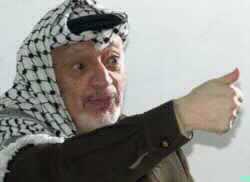HIGHTLIGHTS: Eight Injured Including Four Children||Three More Palestinians Die of Previous Injuries||Palestinian Delegation Conferred with Burns Friday, to Meet Tenet Saturday||Arafat Accepts Foreign Involvement in Reforming His Security Forces||Palestinian Minister of the Interior Endorses Israel Withdrawal|| STORY: Three more Palestinians died in the Gaza Strip overnight, capping a week of unabated violence there, as a high-ranking delegation held talks in Washington on reform of the Palestinian security apparatus.
Fresh violence erupted in the Gaza Strip, when Israeli tanks shelled houses in the autonomous southern town of Khan Yunis early Saturday, injuring eight Palestinians, including four children, medical sources said Saturday.
A teenager who sustained serious head injuries two days ago following clashes with the Israeli army, and a 23-year-old who was wounded during an Israeli incursion into Beit Lahia the same day, died on Saturday morning in Gaza City, the sources said.
A controversial July 23 air raid which targeted a military leader of the Palestinian Resistance group Hamas also claimed a 16th victim late Friday, when Khader al-Saidi, 67, died of his wounds.
WASHINGTON TALKS ON PALESTINIAN SECURITY REFORM CONTINUE
The latest violence came as a Palestinian delegation was preparing for a third and final day of consultations with US officials expected to focus on reform of the Palestinian Authority's unwieldy security forces.
Top Palestinian negotiator Saeb Erakat and interior minister Abdel Razaq al-Yahya held talks with Assistant Secretary of State for Near Eastern Affairs William Burns on Friday and were due to meet CIA chief George Tenet on Saturday, a senior Palestinian official said.
They were expected to seek ways of speeding up the reform of the security apparatus, a few days after the failure of talks over an Israeli proposal to withdraw from reoccupied areas in the Gaza Strip in exchange for a Palestinian crackdown on militants.
The meetings in Washington are the first high-level contacts between the Palestinians and the United States since US President George W. Bush called for Arafat to be dumped in June.
But the Palestinian leader told Qatar's Al-Jazeera satellite television Friday night that he was pleased with the US talks and for the first time accepted the involvement of foreign countries in reforming his security forces.
"Do not forget that it has been agreed that American, Egyptian and Jordanian experts will come to train our security services," said Arafat, adding he hoped such a move would take place soon but without giving a date.
The Israeli occupation army has meanwhile announced it would lift its crippling curfews on Jenin, Ramallah, Bethlehem and Qalqilya Saturday, but in Nablus, considered a hotbed for Palestinian Resistance, the occupation army was continuing its searches.
PALESTINIAN INTERIOR MINISTER ENDORSES ISRAEL WITHDRAWAL
The Palestinian interior minister called an Israeli military withdrawal the best way of ensuring the American vision of a Palestinian state - one of the topics discussed during meetings in Washington.
Abdel Razak Yehiyeh was expected to meet with CIA director George Tenet Saturday to continue what aides in Ramallah in the West Bank including Nabil Abu Rdeneh, aide to Palestinian leader Yasser Arafat have termed "positive meetings."
The Palestinian delegation headed by chief negotiator Saeb Erekat, met with National Security Adviser Condoleezza Rice and Secretary of State Colin Powell in Washington on Thursday.
U.S. officials confirmed Friday that a CIA team met secretly with Palestinian officials and drew up a detailed plan for security reforms. The plan was submitted to the Bush administration last week and recommended profound changes in the operations of the Palestinian security services, the officials said. The team did not meet with Arafat.
PHOTO CAPTION
Palestinian President Yasser Arafat, seen during an August 7 cabinet meeting in Ramallah, announced on August 9 that the U.S., Egypt and Jordan will guide reforms to Palestinian security services. It was the Palestinian leader's first public acceptance of mooted foreign involvement in reforming his security apparatus, which Israel regards as having failed to stop and even abetted, a Palestinian uprising in the West Bank and Gaza Strip. (Osama Silwadi/Reuters)
- Aug 09 1:50 PM
- Author:
& News Agencies - Section:
WORLD HEADLINES


 Home
Home Discover Islam
Discover Islam Quran Recitations
Quran Recitations Lectures
Lectures
 Fatwa
Fatwa Articles
Articles Fiqh
Fiqh E-Books
E-Books Boys & Girls
Boys & Girls  Articles
Articles










